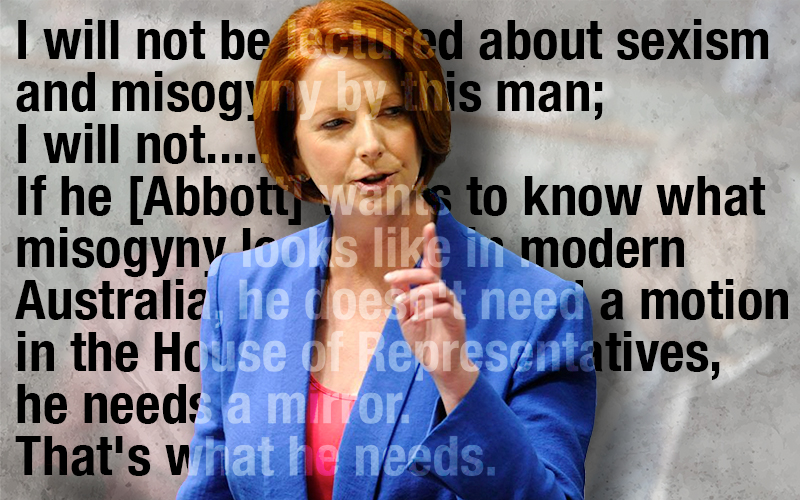The 10th anniversary of Julia Gillard’s so-called misogyny speech is a reminder of what might have been. Chiefly, the loss of a potentially great Australian leader.
The speech resonated around Australia and the world. The Macquarie Dictionary even redefined the word misogyny on the back of it. But beyond the commemorative songs, seminars, studies and symposiums lies the story of the squandered opportunities of the most recent former Labor government.
Maybe things will work out better for Anthony Albanese. After all, he had a front-row seat when Labor burned its two leading lights and opened the door for nine years of generally poor Coalition government. Meanwhile the Gillard story is a reminder of how Labor often wins the culture wars and loses the political ones.
But it is also apparent in 2022 that myths are being bedded down into the authorised record. History as written by the rhetoricians. Time has blurred the factors behind Gillard’s rise and fall.
Kevin 07, Julia forever
When Kevin Rudd took Labor into government in 2007, Gillard played a crucial role as his deputy, the other half of a dream team. She proved a capable administrator in an array of arduous portfolios, chiefly education, and was an effective parliamentary debater.
Rudd, meanwhile, was a sometimes erratic prime minister. Avuncular in public, he raged at underlings behind closed doors, alienating high-ranking ministers. But few such traits were public knowledge when, on the night of June 23, 2010, a delegation of MPs told him he had lost their confidence.
At lunchtime the next day Gillard was sworn in as prime minister by governor-general Quentin Bryce. Australians suddenly had their first female national leader, but it’s fair to say most hadn’t expected it to happen quite that way. Gillard’s cryptic explanation of her rise was that ‘‘a good government had lost its way’’.
Many voters felt deprived of their elected choice as leader, and the opportunity to do their own ejecting of the leader from office. It did not matter to them that the leadership of the nation is as much the gift of a political party as it is the voters’ will.
It took nearly two years before ministers were prepared to explain to the public why Rudd had been untenable. By then Gillard had won her own mandate, if by a razor-thin margin.
The government Gillard led from 2010 to 2013 could have collapsed at any time, but she was able to enact some impressive policies, notably the NDIS, the first insurance scheme for disabled Australians.
‘I will not be lectured’
Gillard was subject to much sexist abuse from the political fringe, but initially insisted she was not in her position as a woman, but as a Labor politician. This emphasis tilted as time went on. Liberal leader Tony Abbott’s relentless attack on her policies blended into the misogyny narrative. Abbott spoke at a rally outside Parliament House under abusive signs, one saying DITCH THE WITCH. Boorish behaviour by Liberal supporters and nasty media, particularly from radio broadcaster Alan Jones, kept tensions high.
Then Labor appointed Peter Slipper, a disaffected Liberal MP, as Speaker of the House to give it an extra number on the floor of the hung parliament. Slipper and an aide’s email exchanges about female genitalia were made public and prompted Abbott’s accusation of misogyny. On October 9, 2012, Gillard made a ringing speech in parliament in response to Abbott’s motion of no-confidence against Slipper.
I will not be lectured about sexism and misogyny by this man. I will not. And the government will not be lectured about sexism and misogyny by this man. Not now, not ever.
The speech was a social media bolter and made Gillard a name to reckon with among feminists. It struck a core for millions of women. But the raw politics behind the speech – the defence of Slipper in a political numbers game – has faded into the mists of history.
And Julia makes six: every PM has done something this campaign
As our first (and thus far only) female prime minister, Gillard will always be seen as a champion of women. But, fatuous as it sounds, many women voted against her. At the only electoral contest Gillard faced, just weeks after assuming the prime ministership, Labor won only 38% of the primary vote.
To be fair, that’s better than Labor has tallied in four elections since. And assuming pretty much every single Greens voter wanted her in office, at least 49.75% of the electorate backed Gillard, a figure mirrored in the tight two-party-preferred vote (50.12% to Labor). Nonetheless Labor needed the support of two rural independent MPs to stay in government.
Alas, Gillard never commanded the public appreciation commensurate with her competent governance. The misogyny speech did not save her. With Gillard’s poll ratings tanking as the 2013 election approached, Labor MPs turned back to Rudd as leader, more in the hope he could save some seats than save the government. He saved 55, fewer than the 58 Scott Morrison held onto at the 2022 election.
Time on her side
Gillard’s story is a reminder that while progressive forces command the social and cultural discourse, the electoral arithmetic often washes out differently. Within a year of ”the speech”, Abbott was prime minister. Although his time in the sun would be brief, the fact remains that Australia has only had six years of Labor in the past 26 years.
When Gillard campaigned in 2007 and 2010, mothers posed their daughters with her as a symbol of girls’ aspirations. But at the end of her term as PM, even some feminist sympathisers accused her of not walking the talk, especially when her government cut a benefit for single mothers with the aim of getting them back into the workforce.
Gillard is lost to elected politics for good. Comebacks in Australian politics never happen, at least not for people who have left parliament. But Gillard is younger than King Charles, Joe Biden, Donald Trump, Nancy Pelosi and the Pope. And for what it’s worth, the ABC’s chair and its contemporary music interviewer.
As MWM noted in the story highlighted above, Gillard at 61 is a Labor elder stateswoman while being only 18 months older than Albanese, who hopes to be around for years. Ministers such as Mark Dreyfus, Don Farrell and Linda Burney are older than Gillard.
What might have been, indeed.
Mark Sawyer is a journalist with extensive experience in print and digital media in Sydney, Melbourne and rural Australia.

